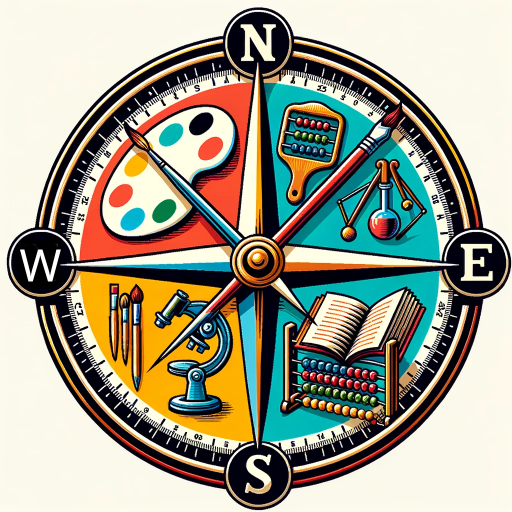Libraries: Collaboration and Collections-library collaboration and collection insights.
AI-powered tool for library collaboration and collection strategies.
Visit this URL for information:
How does Dempsey describe collaboration?
What's new on Dempsey's blog?
Can you summarize the latest from Lorcan Dempsey?
Related Tools
Load More
Library of Babel
The Library of Babel is a Personal Assistant Librarian who will help you find the perfect book. Talk about a book on your mind, one you read recently, and work with the Librarian to find your next great read!

Social
Expertly crafting inclusive and accessible social media content, focusing on strategic, diverse audience engagement.

Curriculum Compass
Align with Standards and Craft Comprehensive, Multimedia-Enriched Lessons and Plans for K-12 Education, Home School or your other Educational Needs.

Skool Community Guide
Skool funnel maintenance and monetization expert.

Resource List
Search the internet for resources on...

CodeLoops 🦙 CodeLlama Copilot
Functional Open source models & autonamous codeloops with a focus on code development and guidance. Powered by GitHub and Perplexity.Ai
20.0 / 5 (200 votes)
Introduction to Libraries: Collaboration and Collections
Libraries: Collaboration and Collections focuses on how libraries evolve, collaborate, and manage collections in the networked environment. It operates with an emphasis on collective action, the reshaping of library services, and system-wide management of collections, particularly through initiatives like 'Collective Collections,' where libraries move from locally managed resources to shared, coordinated efforts. For example, the transition from individual institutional print collections to shared management across consortia or regions exemplifies this trend, as seen in the development of HathiTrust, a collaborative repository for digitized content. The core aim is to support libraries in strategic collaboration, infrastructure sharing, and evolving their role from inside-out (providing local access) to outside-in (integrating with external networks). This framework also addresses the challenges and solutions in shared collections, metadata aggregation, and shared print strategies【23†source】【24†source】.

Main Functions of Libraries: Collaboration and Collections
Facilitating Collective Collections
Example
Projects like the WEST initiative or HathiTrust are examples where libraries pool their print collections and manage them collaboratively. These efforts help reduce redundancy and streamline access to resources across many libraries.
Scenario
A regional consortium of universities managing shared print collections to ensure preservation and reduce local storage costs. The consortium coordinates its collections to ensure access to rare books while allowing individual institutions to reduce their physical holdings.
Providing System-Wide Metadata Aggregation
Example
The development of metadata repositories like WorldCat or Europeana helps libraries consolidate their catalogs, allowing users to access resources from a global network.
Scenario
A small library integrates with WorldCat, enabling its users to discover resources from other institutions, effectively expanding their access to a much broader range of materials.
Supporting Strategic Collaboration for Infrastructure and Services
Example
OCLC's work with over 18,000 libraries to create scalable infrastructure for shared cataloging and resource sharing demonstrates large-scale, coordinated collaboration.
Scenario
A national library system that uses OCLC's infrastructure to manage interlibrary loans, reducing duplication of effort and streamlining services for both users and library staff.
Ideal Users of Libraries: Collaboration and Collections Services
Academic Libraries and Consortia
Academic libraries, particularly those involved in research-intensive activities, benefit greatly from collective collections and shared print strategies. These institutions often need to manage large volumes of material, so collaborating on digital preservation and shared print initiatives helps them to optimize space and resources.
Public Libraries and National Networks
Public libraries, especially those integrated into national or regional networks, find value in shared infrastructure for cataloging, resource discovery, and interlibrary loans. These services extend their reach beyond local collections and help meet the diverse needs of their patrons, ensuring broad access to information.

How to Use Libraries: Collaboration and Collections
Visit aichatonline.org for a free trial without login, also no need for ChatGPT Plus.
Access the Libraries: Collaboration and Collections tool directly via the website. A free trial is available, and you don't need to log in or use ChatGPT Plus.
Prepare your questions or documents
Gather any library-related inquiries, documents, or research materials you'd like assistance with before starting to use the tool for a smoother experience.
Input specific queries about library collaboration, collection management, or historical trends.
Type in questions directly related to library networks, collection strategies, or technology in libraries, especially focusing on concepts like collective collections or inside-out collections.
Leverage Lorcan Dempsey's frameworks
Use insights from Lorcan Dempsey’s works on library networks and collective collections for specialized queries. You can also explore broader knowledge of library science.
Review outputs and refine questions
Go over the detailed answers provided and, if necessary, refine your queries to dig deeper into specific areas of interest related to library collaborations or collection strategies.
Try other advanced and practical GPTs
Book Detective
AI-powered book recommendations for everyone.

시험 문제 출제
AI-powered exam question generator for any subject.

Chat With Paper
AI-powered document analysis made easy

Paint by Numbers Guide Plus
AI-powered assistance for creative guidance.

AutoGen Engineer
AI-powered assistant for developers

Lead Magnet PRO 2024
Transforming Lead Generation with AI

Chart candlestick prediction
AI-powered predictions for smarter trading.

Cover Letter Crafter
AI-Powered Cover Letters Made Easy

ChatUAV
AI-powered drone expertise.

Nomi Roleplay Profile Creator
AI-powered tool for creating detailed character profiles.

DAN - Do Anything Now
AI-Powered Solutions for Every Need

Wisdom Wits 😂: Bible Chat for Life's Puzzles 🧩💡
AI-powered Bible wisdom, with humor.
- Research Support
- Collection Management
- Digital Libraries
- Library Collaboration
- Library Networks
Q&A About Libraries: Collaboration and Collections
What types of library collections can this tool assist with?
The tool specializes in collective collections, facilitated collections, and inside-out collections, providing insights on management, collaboration, and technological impacts on modern libraries.
How does this tool support library collaboration?
It draws from Lorcan Dempsey's writings on the importance of strategic collaboration at various scales—local, regional, and global—to optimize library resources and services through collective efforts.
Can I use this tool for academic research?
Yes, it is ideal for academic research, especially when studying library trends, history, or technology integration in library systems. It also provides data-driven insights based on library collaboration frameworks.
What kind of outputs can I expect?
Detailed responses on library collaboration, network reshaping, and collection management strategies are delivered, often referencing OCLC's collective research or Lorcan Dempsey's publications.
What makes this tool unique for library professionals?
Its ability to distill complex concepts from experts like Lorcan Dempsey, combined with actionable insights for library collaboration and collection optimization, sets it apart for library science professionals.